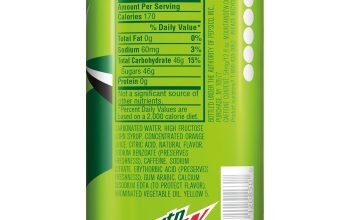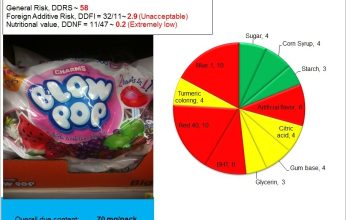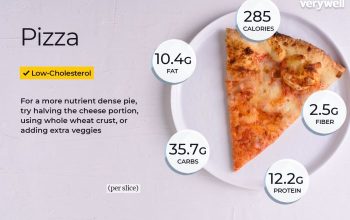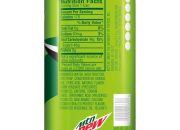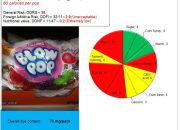Monster Energy Drink Ingredients: Monster Energy Drink Nutrition Facts
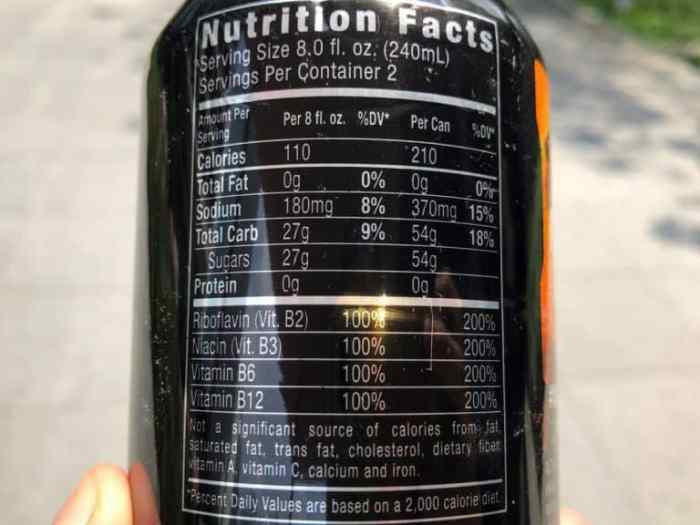
Monster energy drink nutrition facts – Monster Energy drinks, like many energy drinks, contain a blend of ingredients designed to provide a stimulating effect. Understanding these ingredients and their potential impacts is crucial for informed consumption. This section details the components of a typical can, compares it to a competitor, and discusses potential health implications.
Monster Energy Drink Ingredient Breakdown
The precise ingredient list can vary slightly depending on the specific flavor, but a typical can of Monster Energy contains the following:
| Ingredient | Quantity (Approximate per 16 fl oz can) | Function | Potential Health Effects |
|---|---|---|---|
| Carbonated Water | Most of the volume | Base of the drink | Generally harmless; contributes to hydration but can lead to bloating in excess. |
| Sugar (Sucrose) | ~54g | Sweetener; provides energy | High sugar intake is linked to weight gain, type 2 diabetes, and tooth decay. Contributes to energy crashes. |
| Citric Acid | Variable | Provides tartness and acidity | Generally safe in moderate amounts; high intake can erode tooth enamel. |
| Caffeine | ~160mg | Stimulant; increases alertness and energy | Can cause anxiety, insomnia, increased heart rate, and digestive issues at high doses. May be habit-forming. |
| Taurine | ~400mg | Amino acid; purported to improve mental function and athletic performance | Generally considered safe, but high doses may have some adverse effects. Research on its benefits is ongoing. |
| Glucuronolactone | ~200mg | Naturally occurring substance; claimed to reduce fatigue | Generally considered safe; limited research on its effectiveness. |
| Guarana Extract | Variable | Natural source of caffeine | Similar potential health effects as caffeine; can contribute to caffeine overload. |
| Natural and Artificial Flavors | Variable | Provides flavor | Potential for allergic reactions depending on specific flavorings. Artificial flavors have been linked to various health concerns, although the evidence is not conclusive. |
| Other Ingredients (colors, preservatives, etc.) | Variable | Maintain quality and appearance | Potential for allergic reactions or other adverse effects depending on specific ingredients. |
Comparison with Red Bull
Both Monster and Red Bull are popular energy drinks, but their formulations differ slightly.
- Similarities: Both contain high levels of caffeine, sugar, taurine, and often include other stimulants like guarana. Both are carbonated beverages.
- Differences: The exact quantities of these ingredients vary between the brands and flavors. Red Bull often utilizes a slightly different blend of natural and artificial flavors, resulting in a distinct taste profile. Some variations of Monster contain different combinations of B vitamins than Red Bull.
Health Implications of High Caffeine and Sugar Intake
The high levels of caffeine and sugar in Monster Energy drinks present potential health risks with regular, excessive consumption. The caffeine can lead to anxiety, insomnia, jitters, and an increased heart rate. The high sugar content contributes significantly to weight gain, increased risk of type 2 diabetes, and dental problems. The combined effect of these ingredients can lead to energy crashes and potential dependence on the drink for sustained energy.
For example, consuming multiple Monster Energy drinks daily can easily exceed recommended daily caffeine limits, and the significant sugar content far surpasses recommended daily allowances. This can result in negative health consequences over time. Long-term reliance on such drinks to combat fatigue can mask underlying health issues and lead to unhealthy coping mechanisms.
Monster Energy drinks are notorious for their high sugar and caffeine content, a stark contrast to the nutritional profile of healthier alternatives. For those seeking a lower-sugar option, checking out the oikos triple zero yogurt nutrition facts might be beneficial for comparison. Understanding these differences helps consumers make informed choices regarding their daily sugar and calorie intake when considering options beyond Monster Energy drinks.
Consumer Perception and Marketing
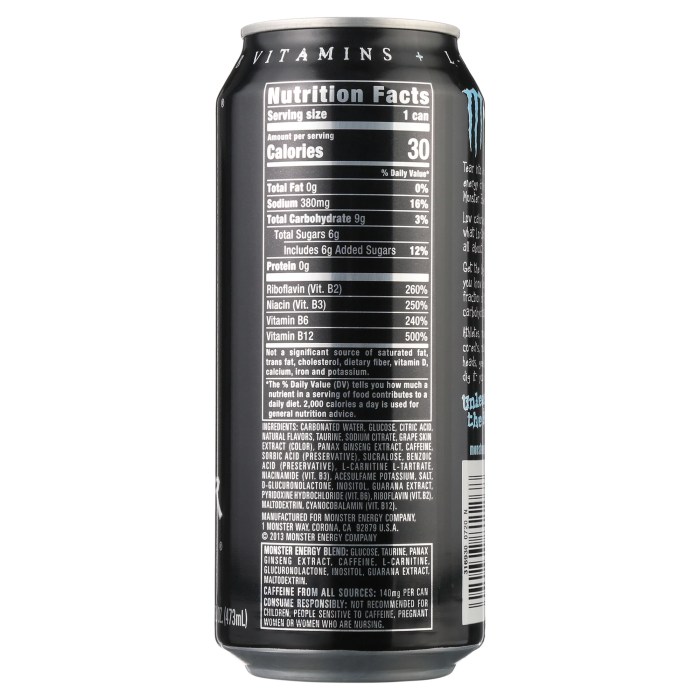
Monster Energy’s marketing success hinges on its ability to cultivate a specific brand image and connect with a targeted consumer base. This involves crafting a message that resonates with the desired demographic and influencing their perception of the product, both positively and potentially negatively regarding its health implications.Monster Energy’s marketing strategies are multifaceted and highly effective in reaching its target audience.
The company skillfully uses a combination of approaches to build brand loyalty and drive sales.
Target Audience
Monster Energy primarily targets young adults, typically aged 18-35, who are active, adventurous, and seek a boost of energy. This demographic is often associated with extreme sports, music festivals, and gaming culture. Marketing campaigns frequently feature extreme athletes, musicians, and gamers, creating a sense of aspirational association. The brand’s imagery consistently emphasizes energy, excitement, and a rebellious spirit, appealing to the youthful desire for self-expression and pushing boundaries.
This carefully constructed persona resonates deeply with the target demographic, making Monster Energy a symbol of their lifestyle.
Marketing Strategies and Messaging
Monster Energy employs a range of marketing strategies, including sponsorship of extreme sports events (like motocross and skateboarding competitions), collaborations with influential personalities in gaming and music, and extensive social media engagement. Their messaging often focuses on themes of adrenaline, performance enhancement, and overcoming challenges. The use of bold graphics, vibrant colors, and edgy slogans reinforces the brand’s rebellious and energetic image.
Advertising campaigns frequently feature high-energy visuals and exciting scenarios, further associating the product with a thrilling and adventurous lifestyle. The use of celebrity endorsements and influencer marketing further amplifies the brand’s reach and impact, shaping consumer perception.
Influence of Marketing on Consumer Perception of Health Implications, Monster energy drink nutrition facts
While Monster Energy’s marketing emphasizes energy and performance, it often downplays or avoids direct discussion of the potential health consequences associated with high caffeine and sugar consumption. This selective messaging can influence consumer perception, leading some to underestimate the risks associated with regular energy drink consumption. The focus on an active and adventurous lifestyle might inadvertently create a perception that the product is a harmless component of a healthy lifestyle, rather than a potentially detrimental one.
This discrepancy between the marketed image and the potential health impacts is a critical aspect of the ongoing debate surrounding energy drinks. The lack of explicit warnings or balanced information in marketing campaigns might lead to a skewed perception of the product’s risks and benefits among consumers, particularly younger audiences who are more susceptible to influence.
FAQ
What are the long-term effects of consuming high levels of caffeine from Monster Energy?
Long-term high caffeine consumption from sources like Monster Energy can lead to increased anxiety, insomnia, digestive issues, and potentially even heart problems. Tolerance can also develop, requiring more caffeine to achieve the same effect.
Does Monster Energy contain any artificial sweeteners?
This varies depending on the specific Monster Energy product. Some varieties may contain artificial sweeteners while others rely solely on sugar. Always check the ingredient list on the specific can.
Are there any vitamins or minerals in Monster Energy?
While Monster Energy does contain some B vitamins, the amounts are relatively small and not a significant source of these nutrients in a balanced diet. It’s not a substitute for a multivitamin.
How does Monster Energy compare to other energy drinks in terms of sugar content?
The sugar content in Monster Energy is comparable to many other leading energy drinks, often being quite high. However, specific sugar content varies between brands and specific products, so it is important to compare labels.
Can I drink Monster Energy every day?
Regular daily consumption of Monster Energy is generally not recommended due to its high sugar and caffeine content. Moderation is key to minimizing potential health risks.

